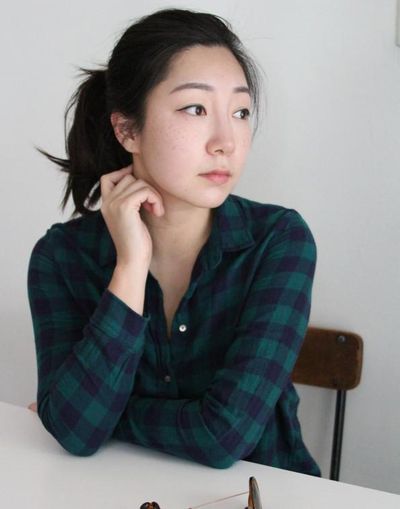Poet E.J. Koh grapples with love

Before you read E. J. Koh’s debut poetry collection, she has a request:
“Jal butak hapnida. // This translates into, Please be kind to me.”
These lines from “Showtime,” the first poem in Koh’s book “A Lesser Love,” hint at the hard personal truths Koh will reveal in the pages that follow – a childhood marked by absent parents and a struggle to get by, the wars and massacres that directly affected her family, the ghosts that haunt her, the need for love, even in its lesser forms.
“I think seeing the possibility of love, in anything, in betrayal, in war, in abuse – I think it asks us to be courageous. It asks us to notice love,” Koh said.
Koh invites others to be courageous with her when she reads Feb. 24 at Auntie’s Bookstore. Following the 7 p.m. reading, she’ll sign copies of “A Lesser Love,” which won the Pleiades Press Editors Prize for Poetry.
Koh’s ability – and desire – to notice love amid pain is evident in how she frames the book. The first section, called “Heaven,” addresses the emotional and physical hungers of a lonely childhood. “Under my showerhead, I drink / the water to feel full,” Koh writes in “Confession.”
So why “Heaven”?
“Heaven is about home,” Koh said. “For me, home is with my mother and father. For them, their home is in another country, South Korea, where they lived while I remained here in the States. Home is personal; heaven is subjective. These poems hold things such as absence very closely because there is no looking away.”
Four poems scattered through this first section, whose titles are street addresses, reflect this absence, presenting a broken narrative of a transient childhood. Reading these poems gives the sense of looking through very small windows into a life that has many walls encircling it. The poems are spare, but the details are intimate – the gingko lotion a girl rubs on her wrists to keep her mother’s scent close, a pair of socks on a nightstand, a forehead split open on the handle of a refrigerator.
Koh’s parents were gone during her teenage and adult years, and these poems “go back to our childhood together,” she said. “I think there are younger parts of me that wanted to come up with reasons why they left, and one of them was seeing how unhappy my mother was being in the States. I moved around quite a bit, and there was a sort of helplessness, my own powerlessness to make them happy as a child.”
The book’s second section, “War,” is deeply personal as well, even as it addresses larger conflicts and delves into history.
“These wars: WWII, Korean War, and the massacres that occurred in South Korea, one of them being the Jeju Island massacre where my great-grandfather was stoned – these things are not far away, but near to my family history. In a way, they are embedded in our genes, the trauma, the experiences, and really, poetry is another way to release, interact, reconcile these events that perpetually play themselves out in our lives,” Koh said.
Koh’s work at reconciliation extends beyond poetry. The Seattle resident, who is working on a doctorate at the University of Washington, has degrees in both creative writing and literary translation in Korean and Japanese. While a graduate student at Columbia University, she translated the work of Korean poet Kim Myung Won and was introduced to the work of another Korean poet, Yi Won, whose work she has also been translating.
“There are generations of Korean modernist women poets, and I think it’s important for me, not only as a poet, but as a woman, a Korean woman, to look to them, to observe and to learn, to gather and humble myself before their arduous work,” Koh said.
She’s also translating the letters her mother wrote to her during their years apart, turning them into a memoir. While working on this project, Koh wanted to do something for other people – “to show what I have learned from her letters, to put it into practice.”
So she started writing love letters to strangers, “because I myself needed one so desperately when I was a small girl.”
On her website, thisisejkoh.com, Koh talks about some of the people who have requested love letters so far. People describe themselves many ways, but there is a common thread: “Not one considered themselves good.” And in their regrets and aches, Koh began to see in these strangers “multitudes of myself – and myself a constitution of them,” she says on the site.
Given Koh’s determination to see and show love, it’s fitting that her book’s third and final section is titled “Love.” The poems here don’t ignore difficulty, still acknowledging “the halo of human fear that is acidic,” still pushing their hands into coat pockets where “Cold fingers / nip at the lint of my childhood.” But they turn with clear determination toward hope.
“ ‘A Lesser Love,’ no matter how steeply it drops into darker narratives, I think it always comes back up for air, for light, and hope,” Koh said. “ ‘A Lesser Love’ can simultaneously hold something painful and see in it a strikingly beautiful thing.”